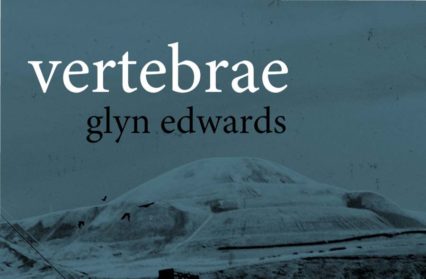Laura May Webb reviews the debut poetry collection from Glyn F. Edward, Vertebrae.
Vertebrae is the first collection from Welsh poet Glyn Edwards. Composed of thirty-three poems to reflect the thirty-three spinal vertebrae, the collection opens and closes with images of the spine, although the author reveals in interview that he ‘intended the poems to be more about skeletons than the spine, insomuch as these poems are unified more by their awareness of mortality than direct associations to the human frame’. Indeed, skeletons are a useful analogy for the reading of this collection which gives us the frame — the bare bones — to flesh out with our own understanding and interpretation of poems that journey through time, place and a range of human experiences. There is a delicate, precarious balance between life and death and an uncensored, raw honesty that finds the beauty in a sometimes-stark reality, without romanticising.
Romance is Dead?
Iron Age desire was forged in the brain,
Celts felt lust in their guts, the Greeks a quiver
from a love lodged in the spleen, the liver,
you give me your lips, your lungs, your womb,keep your heart, leave me your windpipe instead,
so it can’t ever be said romance is dead.
Love is practical, scientific, tangible and real in this collection. It is love for the woman with ‘damp feet, sheepshit covering them in frogspawn’ and a fisherman’s jumper in Wuthering Heights, and the strange and unsettling sentiment in “A Frontal Lobe Love Poem” that ‘When my heart stops I hope I’m lucid enough That the remnant of my dying brain is you’. It is the bitter-sweet process of watching our infants grow up and away, ‘Away from here. Away from me. So I stanch you In a soft, white towel and suffocate your escape. So tightly you stop growing.’, and wondering What to do with his old clothes? It is the dashed hope of young love that turns the author into an elephant in “Pachyderm”, a summer where he ‘slept grey woke grey’, and the guilt for the grandparent who died alone in “Voicemail”.
This a collection that is both haunting and haunted, with beautiful, detailed imagery a constant feature in an otherwise disjointed collection. There are themes that recur throughout: skeletons and bones, science and love, the sea and nature among them, but in no apparent order. The collection is at times highly personal and temptingly dark, from the image of the author forcing tired fingers down his throat to haul a thrashing pike out of his head in “Night Fishing” to the struggle with language in “Lambing Language” where the author is ‘dragged’ through ‘bogs of plurals’ and ‘webs of pronouns’:
In the mornings, I run: a bird on four legs, labelling
the world from behind the shallow walls. By evening,
I see shadows of how I may mutate: swollen
with syntax, fat with cliché, carelessly
shitting accidents until soiled language
greys my coat and I am too stubborn
to wipe it away.
The right words appear elusive as Edwards uses language in inventive, surprising ways that bring the reader tantalisingly close to understanding yet unable to fully grasp the imagery in the poems in the collection. Rain ‘giggles down’ and the sea ‘silvers’. In “The Birthday Walk”, there is a ‘grey-frowning sky’ and ‘half-clothed oaks’, horseflies ‘canter’ and boats are ‘tight-lipped’. The ‘morning is puddled in the room’ in “Storm Arthur” as the ‘sky shrugs’. In this poem, words have a life of their own:
Sharp and dark in the cold spring night,
black words become trapped bats,
senseless and shapeless,
frenzied as they try to escape.
The author wrestles with life and language, compelled to write but at the same time battling to find the right words. There is a melancholic air to the collection, no more so than in the subtle notes of war trauma seen in “Yr Ysgwrn”, where despite leaving ‘a shelter dug down in some thudding field near Ypres’, the unidentified ‘he’ knows that ‘over the parapet, he would always be at war’, and “Waking to find Wilfred Owen has left Craiglockhart” where recovering soldiers’ ‘bodies once broken’ want to ‘rebreak’ when they learn they will be sent back to the front. In “Two Paths Diverge in a Yellow Wood” the trenches of war are indistinguishable from the ‘trenches of ink’.
This is a collection of contradictions, distinctly Welsh but not in a way that alienates or isolates; a personal journey that invites readers to identify at the same time as the language keeps you at arms-length. Brilliantly intricate yet breathtakingly simple, you will lose yourself in the depths of Edward’s heartbreakingly honest prose until the author gathers you up as the protagonist in “Gertrude’s Truth” gathers news over their shoulder ‘like a body’ and struggles with the strain. Edwards delivers us to from the cradle to the grave, takes us from the valleys of Wales to war trenches in French fields, and through shirtless summers and O-shaped autumns with poetry that would have you question the very bones of your existence. Thirty-three poems, thirty-three vertebrae, thirty-three new ways to look at love, language and life.
Vertebrae by Glyn Edwards is available now from The Lonely Press.
You might also like…
Nathan Munday reviews Small, the new collection from Natalie Ann Holborow which weaves a haunting eating disorder with folklore and mythology.
Laura May Webb is a contributor to Wales Arts Review.











